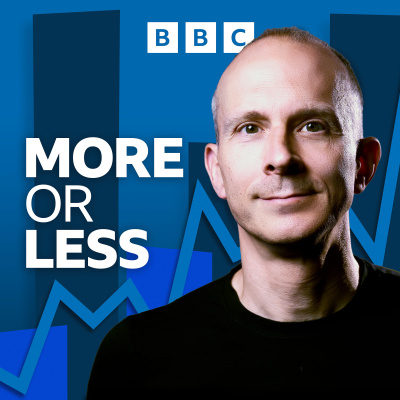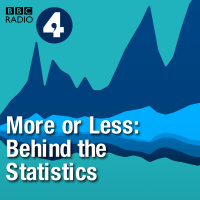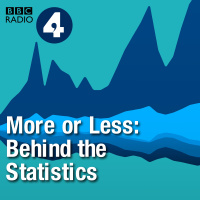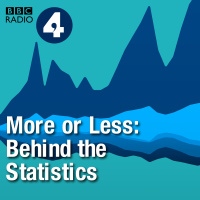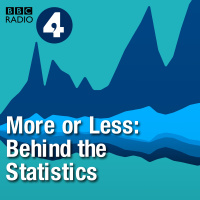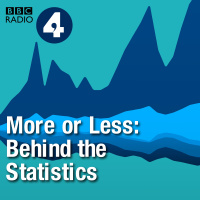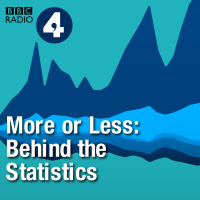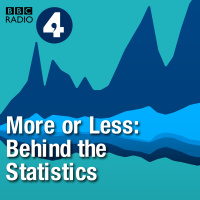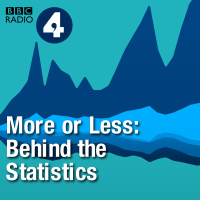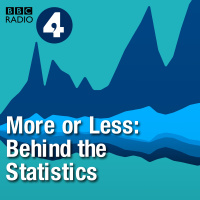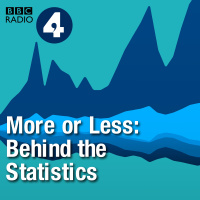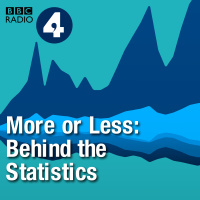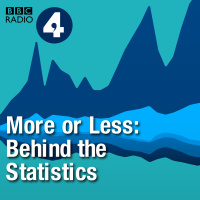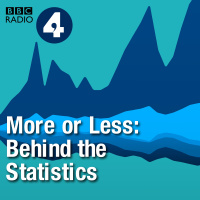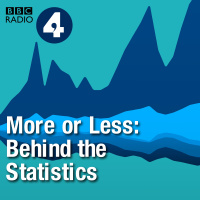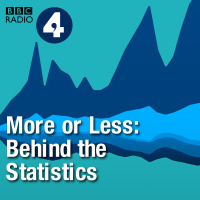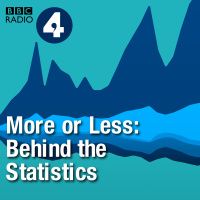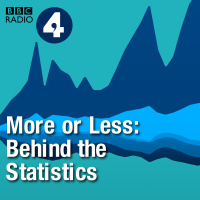Synopsis
Tim Harford and the More or Less team try to make sense of the statistics which surround us. From BBC Radio 4
Episodes
-
Improving the numbers in the news
12/11/2022 Duration: 08minHow can journalists improve their use of statistics in their reporting of the world around us? It’s a question US academics John Bailer and Rosemary Pennington tackle in their new book Statistics Behind the Headlines. They join Tim Harford to talk about how journalism can be improved by asking the right questions about numbers and using them in the wider context of a story. Presenter: Tim Harford Producer: Jon Bithrey Editor: Simon Watts Production Coordinator: Jacqui Johnson Sound Engineer: Graham Puddifoot(Image: Electronic and paper media: scanrail/Getty)
-
Lula’s “zero deforestation” plan for the Amazon
05/11/2022 Duration: 08minLula Da Silva has pledged “zero deforestation” in the Amazon as he prepares to become Brazil’s next president, in contrast to the policies of outgoing leader Jair Bolsonaro under whom the destruction of the rainforest has soared. On this edition of More or Less we ask how much of the Amazon has been lost and whether Lula’s aim of zero deforestation can be achieved.Presenter and producer: Jon Bithrey Editor: Simon Watts: Sound engineer: David Crackles Production Co-ordinator: Jacqui Johnson(Image: Aerial view of the deforestation of the Amazon: Reuters/Ueslei Marcelino/File Photo)
-
Can China’s GDP data be trusted?
29/10/2022 Duration: 08minThis week, China released its third quarter GDP figure. At 3.9%, its rate of economic growth is better than many analysts expected, but still significantly short of the 5.5% target the Chinese government had set itself. There was an unprecedented delay in releasing this particular GDP stat - and that delay coincided with the 20th Chinese Communist Party congress. President Xi Jinping was reappointed for a historic third term at the twice-a-decade gathering. Some analysts found the delay suspicious. Did President Xi postpone the release of the GDP figures so it wouldn’t tarnish the congress? And can the figure of 3.9 per cent be trusted anyway? Paul Connolly investigates with the help of John Burn Murdoch, Chief Data Reporter at The Financial Times; Associate Professor of Government at Cornell, Jeremy Lee Wallace and Dr Linda Yueh, Oxford University economist and author. Presenter and Producer: Paul Connolly Editor: Simon Watts Programme Coordinator: Jacqui Johnson Sound Engineer: Neva Missirian (Ima
-
Do half of new books really sell fewer than twelve copies?
22/10/2022 Duration: 08minA US government lawyer recently caused a stir in the publishing world when he said during a high profile legal trial that half of all new trade titles – books aimed at a general audience - sell a dozen copies or less. Tim Harford investigates with the help of Kristen McLean from the NPD Books group.Presenter: Tim Harford Producers: Octavia Woodward, Jon Bithrey Editor: Emma Rippon Production Coordinator: Jacqui Johnson Sound Engineer: Graham Puddifoot (Image: Stack of books on display at the bookstore: bitterfly/Getty)
-
Ben Bernanke and the magic of banking
15/10/2022 Duration: 10minThe former head of the US Federal Reserve Ben Bernanke is named as one of three winners of the 2022 Nobel Prize in Economic Sciences for his work on how banking collapses were a major factor in the Great Depression of the 1930s. He shares the prize with two fellow US academics, Douglas Diamond and Philip Dybvig. Tim Harford discusses the significance of their work focusing on the role of banks and why their smooth functioning is so important to society. Presenter: Charlotte McDonald Producer: Jon Bithrey Editor: Emma Rippon Production Coordinator: Jacqui Johnson Sound Engineer: James Beard (Image: Former Federal Reserve chairman Ben Bernanke speaks after he was named among three U.S. economists awarded the 2022 Nobel Economics Prize, during a news conference at the Brookings Institution in Washington, U.S., October 10, 2022. REUTERS/Ken Cedeno)
-
Catching Chess Cheats with Data
08/10/2022 Duration: 08minA cheating scandal is currently rocking the world of chess, as World Champion Magnus Carlsen accuses the young American Hans Niemann of cheating. A bombshell new report has said that Niemann is likely to have cheated in over 100 games online, and uses data to support its argument.So how is statistics being used to catch cheats in chess - and just how prevalent might cheating be at the highest levels of the game? David Edmonds finds out. Presenter: David Edmonds Producer: Nathan Gower Editor: Richard Vadon Programme Coordinator: Jacqui Johnson Sound Engineer: Graham Puddifoot(Image: US international grandmaster Hans Niemann, St. Louis, Missouri, on October 6, 2022: Photo by Tim Vizer /AFP via Getty Images)
-
Teens and antidepressants, stamp duty savings and earthquake probabilities
07/10/2022 Duration: 28minA survey from a mental health charity suggested that more than a third of British teenagers had been prescribed antidepressants. We debunk the figure. Also we investigate a tweet from the UK Treasury about how much homebuyers will save in stamp duty. Plus how Mexico has been hit by earthquakes three times on the same day of the year - what are the chances? And how incorrect figures from the government have given a false picture of the number of cars on Britain’s minor roads. Presenter: Tim Harford Series producer: Jon Bithrey Reporters: Nathan Gower, Charlotte McDonald Production Coordinator: Jacqui Johnson Sound Engineer: James Beard
-
NASA’s asteroid collision: how many asteroids are really out there?
01/10/2022 Duration: 09minThis week NASA slammed a spacecraft into an asteroid in the hope of diverting its course. The Double Asteroid Redirection Test or DART mission will help scientists understand how easy it would be protect Earth if one was headed in our direction. More Or Less first discussed this in 2016 with a little help from the movie Armageddon – with listeners getting in touch once again we ask how many asteroids are really out there and how dangerous they might be to Earth. Presenters: Charlotte McDonald and Simon Maybin Producer: Charlotte McDonald Editor: Richard Vadon Production Coordinator: Jacqui Johnson Sound Engineer: James Beard (Image: 3D rendering of a swarm of Meteorites or asteroids entering the Earth atmosphere: ratpack223/ Getty)
-
Falling pound, the Queen’s funeral and is 0.5 on the Richter scale a big number?
28/09/2022 Duration: 29minThe value of the pound against other currencies has been incredibly volatile ever since the Chancellor’s ‘mini-budget’. We ask how much we should worry and look at how much taxes will really fall. Also did 4.1 billion people really watch the Queen’s funeral? Gas prices are falling – so why aren’t energy bills? There are early signs that new covid variants could cause another spike in cases over the winter. And with the government lifting a moratorium on fracking, we ask how seismic a number the current limit of 0.5 on the Richter scale actually is.Presenter: Tim Harford Series Producer: Jon Bithrey Reporters: Charlotte McDonald, Nathan Gower Production Coordinator: Jacqui Johnson Sound Engineer: James Beard
-
Ukraine’s progress in numbers
24/09/2022 Duration: 10minUkraine has reportedly recaptured nearly 10,000 square kilometres of territory that had been occupied by Russia. We ask where the numbers come from and what they mean. Plus with Norway supplanting Russia to become Europe’s biggest supplier of natural gas, we ask how much money the country is making from the increased demand and higher prices.Presenter: Tim Harford Producer: Jon Bithrey Editor: Richard Vadon Production Coordinator: Jacqui Johnson Sound Engineer: Neil Churchill
-
Ukraine offensive, weak pound & how much do women really exercise
22/09/2022 Duration: 28minUkraine has reportedly recaptured nearly 10,000 square kilometres of territory that had been occupied by Russia. We ask where the numbers come from, what they mean and why everyone is comparing them to the size of Greater London. We ask how much money Norway is making out of the current energy crisis. Also why is the pound so weak against the dollar, some odd claims about women and exercise and does it really take 20,000 uses for an organic cotton bag to become more environmentally friendly than a plastic bag?Presenter: Tim Harford Series producer: Jon Bithrey Reporters: Charlotte McDonald, Nathan Gower Production Coordinator: Jacqui Johnson Editor: Richard Vadon
-
How bad is fashion for the environment?
17/09/2022 Duration: 08minIs fashion really the second most polluting industry after oil and does it account for 10% of greenhouse gas emissions? Sustainable fashion journalist Alden Wicker does some fashion fact checking with Adam Fleming, presenter of BBC podcast and Radio 4 programme Antisocial. And reporter Charlotte McDonald revisits a claim made in an edition of More or Less last month about the effectiveness of using condoms as a form of contraception.Presenter: Tim Harford Producer: Jon Bithrey Editor: Richard Vadon Production Coordinator: Jacqui Johnson Sound Engineer: Rod Farquhar (Image: Models display outfits / BBC images/Susana Vera/Reuters)
-
Energy crisis plan, imperial measures survey, gardens v national parks
14/09/2022 Duration: 28minOne of Liz Truss's first acts as Prime Minister was to announce a giant plan to protect domestic energy users from huge rises in wholesale gas and electricity costs, meaning a typical household will pay about £1000 less than otherwise would have been the case. We ask how much the Energy Price Guarantee will cost the government and also explain what a “typical” household really is. A consultation has opened into whether we’d like more of our goods and services priced in imperial measures – but some listeners are suggesting a survey on the issue is biased against metric. And we examine a claim made on the BBC’s Springwatch programme that all of the gardens in Newcastle are bigger than the combined size of our national parks.Presenter: Tim Harford Series producer: Jon Bithrey Reporters: Nathan Gower, Charlotte McDonald Production Coordinator: Jacqui Johnson Editor: Richard Vadon
-
Is a third of Pakistan really under water?
10/09/2022 Duration: 08minPakistan is battling a huge natural disaster as a result of heavy monsoon rains. It’s been widely reported that a third of the country is under water. But can that really be the case? Featuring the BBC’s correspondent in Pakistan Pumza Fihlani and Dr Simon Cook, a senior lecturer in Environmental Science at the University of Dundee. Presenter: Tim Harford Producer: Jon Bithrey Editor: Richard Vadon Production Coordinator: Jacqui Johnson Sound Engineers: Graham Puddifoot & James Beard(Image: aerial photograph of flooded residential areas after heavy monsoon rains in Dera Allah Yar, Balochistan province. Credit: Getty/Fida Hussain)
-
Pakistan flooding, UK power prices and Boris’s broadband claim
07/09/2022 Duration: 28minDevastating floods have wreaked havoc across Pakistan after the heaviest monsoon rains in at least a decade. But is a third of the country really under water, as has been claimed? Also why do electricity prices in the UK rise in line with gas prices when we get so much of our power from other sources like nuclear, wind and solar? As criminal barristers go on strike in England and Wales, we ask if those starting in the profession really earn £12,200 a year. And as Boris Johnson waves goodbye to Downing Street, we investigate his claim that 70% of the UK now has access to gigabit broadband.Presenter: Tim Harford Series producer: Jon Bithrey Reporters: Nathan Gower, Charlotte McDonald Production Coordinator: Jacqui Johnson Editor: Richard Vadon
-
Can we use maths to beat the robots?
03/09/2022 Duration: 08minDaily advances in the technology of artificial intelligence may leave humans playing catch-up – but in at least one area we can still retain an edge, mathematics. However it’ll require changes in how we think about and teach maths and we may still have to leave the simple adding up to the computers. Junaid Mubeen, author of Mathematical Intelligence, tells Tim Harford what it’ll take to stay ahead of the machines.Presenter: Tim Harford Producer: Jon Bithrey Sound Engineer: Rod Farquhar Production Coordinator: Jacqui Johnson Editor: Richard Vadon(Image: Digital generated image of artificial intelligence robot scanning the data: Getty / Andriy Onufriyenko)
-
Energy prices, excess deaths and the race to count to 200
31/08/2022 Duration: 28minWith energy prices in the UK spiralling, Tim Harford asks whether there is an easy and realistic way for bills to be cut. Also the number of excess deaths in the UK is rising – we’ll hear how much covid is still to blame. We return to the subject of counting in twenties, this time hearing how the Welsh language mixes traditional and decimal systems. And we debunk some spurious social media claims around Liverpool players and asthma medication.
-
Kenya’s Election Rounding Error
27/08/2022 Duration: 08minWhen the official figures were announced in Kenya’s presidential election, it looked like the total percentage share of the vote for each candidate came to more than 100%. As this should not be possible, many wondered if up to 142,000 votes might be miscounted. We explore what turns out to be a simple mathematical misunderstanding of the numbers.
-
The numbers behind “natural” birth control
20/08/2022 Duration: 09minVideos on TikTok have been claiming that so-called “natural” birth control methods can be 99% effective. We examine what we really know, and how we know it.
-
Is opinion polling broken?
13/08/2022 Duration: 08minThe opinion polling industry’s reputation has taken a battering in recent years, as high profile slip-ups in the US presidential election exposed frailties. So should we write them off? Not according to Economist data journalist G Elliot Morris, who’s written a book called Strength in Numbers: How Polls Work and Why We Need Them.Presenter: Tim Harford Producer: Jon Bithrey Editor: Richard Vadon Programme Coordinator: Brenda Brown Sound Engineer: Rod Farquhar
